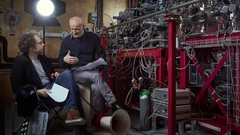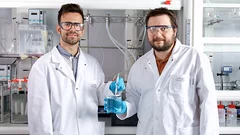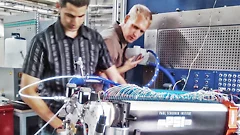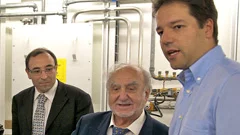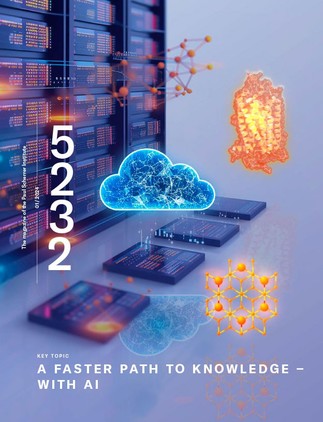Storage
Movie directors with extra roles
Data storage devices based on novel materials are expected to make it possible to record information in a smaller space, at higher speed, and with greater energy efficiency than ever before. Movies shot with the X-ray laser show what happens inside potential new storage media, as well as how the processes by which the material switches between two states can be optimised.
Water pathways make fuel cells more efficient
Researchers from the Paul Scherrer Institute (PSI) have developed a coating technique in the laboratory conditions that could raise the efficiency of fuel cells. The PSI scientists have already applied to patent the technique, which is suitable for mass production.
Golden Idea Award der IDEE-SUISSE an Aldo Steinfeld
Für seine Arbeiten zur Erzeugung von Syngas aus Kohlendioxid und Wasser mithilfe konzentrierter Sonnenenergie erhält Aldo Steinfeld, Leiter des Labors für Solartechnik am Paul Scherrer Institut und Professor für Erneuerbare Energieträger an der ETH Zürich, den Golden Idea Award der IDEE-SUISSE, der Schweizerischen Gesellschaft für Ideen- und Innovationsmanagement. Syngas ist eine Vorstufe verschiedener flüssiger Treibstoffe.This news release is only available in German.
Potenzial einer kostengünstigen Brennstoffzelle für Autos aufgezeigt
Das Paul Scherrer Institut PSI und die Belenos Clean Power AG haben ein Brennstoffzellensystem entwickelt, das das Potenzial aufweist, kostengünstig in einen Kleinwagen eingebaut zu werden, der dann über seine Lebenszeit ähnlich viel kosten würde wie ein herkömmliches Auto. Für diesen wichtigen Schritt in Richtung umweltfreundliche Mobilität erhalten PSI und Belenos den Watt d’Or 2011.This news release is only available in French and German.
Die Belenos Clean Power AG und das Paul Scherrer Institut beschliessen die Schweizer Brennstoffzelle
Die Vision geht in die operative Phase. Ein nachhaltiger, sauberer Energieverbrauch und eine individuelle Mobilität mit sauberer, CO2-freier Energie, das ist die Vision der Belenos Clean Power AG. Um dieses Ziel zu erreichen, müssen Anstrengungen unternommen werden, die die ganze Kette von der nachhaltigen Primärenergie à der Sonne à über die saubere Energie für Haushalte, Fabriken u. ä., bis zum effizienten, emissionsfreien Auto-Antrieb umfassen.This news release is only available in French and German.
